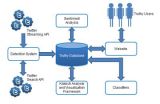(Press-News.org) In comments sent to Secretary Kathleen Sebelius at the U.S. Department of Health and Human Services, AMIA (American Medical Informatics Association) called out 10 specific challenges to proposed modifications to HIPAA Privacy and Enforcement Rules. AMIA's comments, sent on behalf of its membership of 4,000 informatics professionals, detail key issues of concern related to the Notice of Proposed Rulemaking (NPRM) on HIPAA modifications, along with suggestions for models of change. The following areas were cited:
Business Associates and Subcontractors
Position: AMIA supports the NPRM in extending requirements of the Privacy and Security Rules for Business Associates (BAs) to their subcontractors. AMIA supports the extension of HIPAA rule compliance obligations to specific types of BAs, including health information exchanges (HIEs), Regional Health Information organizations (RHIOs), and personal health record (PHR) vendors as stipulated by HITECH.
AMIA is concerned about operational and financial challenges of extending and executing agreements related to the use and disclosure of protected health information "downstream".
AMIA suggests that HHS consider the development of 'model' BA contract language in the Final Rule.
Marketing and Fundraising
Position: Currently, communications related to prescribed drugs and biologics qualify as health care operations, which are excepted from the definition of marketing. Health care operations do not require patient authorizations and are eligible for remuneration as associated costs. AMIA supports inclusion of legitimate treatment communications, such as educational support materials distributed by Covered Entities, in the definition of qualified health care operations.
AMIA supports the opportunity for patients to 'opt out' of future fundraising solicitations, but does not see a benefit to offering 'opt out' statements prior to first solicitations.
Prohibition of Sale of PHI
Position: AMIA opposes a change in the current definition for Limited Data Sets (LDSs) from "not fully identifiable" protected health information (PHI) to "fully identifiable" PHI, which would prohibit the sale of LDSs, and provide little incentive for Covered Entities to create, maintain, use, and make available very large electronic data sets.
AMIA suggests modified language to new § 164.508 (a)(4)(ii)(B), which would make an exception for research purposes, cost restrictions for PHI exchanged in the form of limited data sets. If cost restrictions related to § 164.508 (a)(4)(ii)(B) are included in the Final Rule, AMIA urges the HHS to consider including all costs related to aggregating electronic PHI in general, or LDSs in particular, and not limiting costs to "staff time".
Research
Position: For research projects with both "conditioned" and "unconditioned" authorization requirements, AMIA supports the NPRM proposal for one compound authorization.
Related to the development of HIPAA authorizations that would permit future use and disclosure of PHI for research purposes, if an authorization form describes such future research activities or uses in sufficient detail to allow meaningful informed consent, AMIA suggests inclusion of a mechanism to allow an individual to revoke an "unspecified" authorization at any time.
To facilitate health research, currently viewed as impeded due to the enormous burdens related to HIPAA 'enforcement' placed on Internal Review Boards (IRBs), AMIA believes that HHS should provide strong guidance and clear expectations to IRBs regarding HIPAA, perhaps through the development of FAQs that illuminate IRB policies for reviewing and approving, or justification for not approving health information use for information-based research projects.
Restricting Information Based on Self-Payment
Position: AMIA opposes the NPRM stipulation that Covered Entities must permit the individual to restrict disclosure of any part or all health care items and services if the individual chooses to self-pay. AMIA expresses concern that adoption of this stipulation will foster negative policy implications to a legislatively-required restriction, encourage individuals to "buy privacy" by not using insurance, and create operational difficulties in trying to ensure that information systems can segregate and restrict data flow to payers.
AMIA does not believe it is possible to develop a system in which self-pay restrictions will flow to downstream providers accurately and consistently.
Notice of Privacy Practices (NPP)
Position: AMIA opposes any new addition to privacy notice requirements due to the fact that NPPs are already exceedingly long and complicated, increases in NPPs will not serve a "pro-privacy" purpose to effectively convey information to the vast majority of patients and may decrease the likelihood that patients will read and understand their privacy options.
Individual Access to PHI
Position: AMIA supports a time requirement of less than 30 days for a patient to receive access to or copies of their individual electronic PHI. However, AMIA cautions HHS to adopt a timeline of reasonable length so as not to negatively affect or divert healthcare provider resources to address such requests.
Enforcement
Position: AMIA opposes adoption of the currently proposed framework for addressing complaints and assigning penalties for Privacy Rule violations without further discussion and definition by HHS of the terms "reputational harm" and "indications of non-compliance".
Privacy Rule Time Limits
Position: AMIA supports limiting application of the Privacy Rule to a period of 50 years after death, viewing this term as appropriate for not causing harm to decedents and allowing for the potential use of data for research purposes.
Immunization Records
Position: AMIA supports permission for Covered Entities to disclose a child's immunization records to a school, with oral consent, rather than written authorization from a child's parent or guardian in order to facilitate compliance with state laws requiring proof of immunization prior to enrollment.
AMIA's comments to HHS are online in their entirety at www.amia.org/public-policy. AMIA, the leading professional association for informatics professionals, serves as the voice of the nation's top biomedical and health informatics professionals and plays an important role in medicine, health care, and science, encouraging the use of data, information and knowledge to improve both human health and delivery of healthcare services.
INFORMATION:
For more information, contact:
Nancy Light
nlight@amia.org
301-657-5903
END
Although the magnificent frigatebird may be the least likely animal on the Galapagos Islands to be unique to the area, it turns out the Galapagos population of this tropical seabird may be its own genetically distinct species warranting a new conservation status, according to a paper by researchers at the Smithsonian Conservation Biology Institute, the Smithsonian's National Museum of Natural History and the University of Missouri-St. Louis published last week in the scientific journal Proceedings of the Royal Society B.
The Galapagos Islands, which once served as a scientific ...
When the scientific and spiritual worlds collide, they do so in the most surprising ways. Classical meteorological and plant science has, in the last century, insisted that dew negatively affects plant life, leading to rot and fungus. But in the Judeo-Christian tradition, dew is most welcomed as an important source of vegetative and plant life, celebrated in poetry and prayer.
Now Prof. Pinhas Alpert of Tel Aviv University's Department of Geophysics and Planetary Sciences has developed an explanation for the perplexing paradox with his colleagues. According to scientific ...
A study carried out by Spanish researchers has shown that the presence of chemical contaminants can interact with noise and modify, for good or for bad, the way in which work-related "deafness" – which is increasingly common among young people – manifests itself. Noise-related hearing loss is the most common occupational disease in Europe.
"Workers exposed to noise in the presence of metalworking fluids exhibit a delay in hearing alteration in comparison with those exposed only to noise at the same intensity. However, those exposed to noise in the presence of welding ...
Astroturfers, Twitter-bombers and smear campaigners need beware this election season as a group of leading Indiana University information and computer scientists today unleashed Truthy.indiana.edu, a sophisticated new Twitter-based research tool that combines data mining, social network analysis and crowdsourcing to uncover deceptive tactics and misinformation leading up to the Nov. 2 elections.
Combing through thousands of tweets per hour in search of political keywords, the team based out of IU's School of Informatics and Computing will isolate patterns of interest ...
FORT WORTH, TEXAS, USA, September 28, 2010—The outbreak of whooping cough in Texas, California, and other states this year underscores the critical importance of widespread vaccination coverage, both locally as well as around the world, said a leading global health official attending conferences on world affairs and immunization in Fort Worth this week.
Alex Palacios, a special representative of the GAVI Alliance, a public-private partnership aimed at increasing immunisation rates in poor countries, said that despite public health advances in the US and other wealthy countries ...
More than half of all people are hosts to Candida albicans in their bodies. This species might be located on their skin or mucous membranes or in the intestines – frequently without causing any symptoms. However, it can be dangerous to patients whose immunological system has been weakened such as after organ transplants or chemotherapy with cancer. Then, this fungus penetrates into deeper layers of tissue and uses the blood system to spread throughout the body. In Germany alone, several thousand people die from systemic candida infections every year.
But why does Candida ...
Sept. 28, 2010 -- A new report from the National Research Council says that more organized and systematic procedures for gathering and evaluating data on Missouri River sediment are required to improve decisions and better manage the river's ecosystem, including protecting endangered species and developing water quality standards. In addition, the report finds that the U.S. Army Corps of Engineers' projects to restore habitats along the Missouri River are not significantly changing the size of the oxygen-depleted "dead zone" in the Gulf of Mexico, nor will options for ...
Just imagine your car suddenly comes to a halt on a quiet country road, and it's only four years old. This is not a pleasant thought. A breakdown is expensive. Not to mention the safety risk to the occupants – because the breakdown was caused by the extremely light plastic wheels so highly praised by the car salesman. One of them has broken. »Such a scenario must, of course, never happen in reality,« states Prof. Dr.-Ing. Andreas Büter from the Fraunhofer Institute for Structural Durability and System Reliability LBF in Darmstadt. The experts there specialize in operational ...
A Wildlife Conservation Society (WCS) study on nesting birds in Argentina finds that increasing temperatures and rainfall—both side effects of climate change in some parts of the world—could be bad for birds of South America, but great for some of their parasites which thrive in warmer and wetter conditions.
The study, which looked at nesting forest birds in Santa Fe, Argentina, found that increases in temperature and precipitation produce a bumper crop of parasitic fly larvae of the species Philornis torquans, parasites that burrow into the skin of baby birds to feed. ...
A new study by USC researchers reveals that stressed men looking at angry faces had diminished activity in the brain regions responsible for understanding others' feelings.
Turns out the silent and stoic response to stress might be a guy thing after all.
"These are the first findings to indicate that sex differences in the effects of stress on social behavior extend to one of the most basic social transactions — processing someone else's facial expression," said Mara Mather, director of the Emotion and Cognition Lab at USC.
In an article appearing the October 6 issue ...





